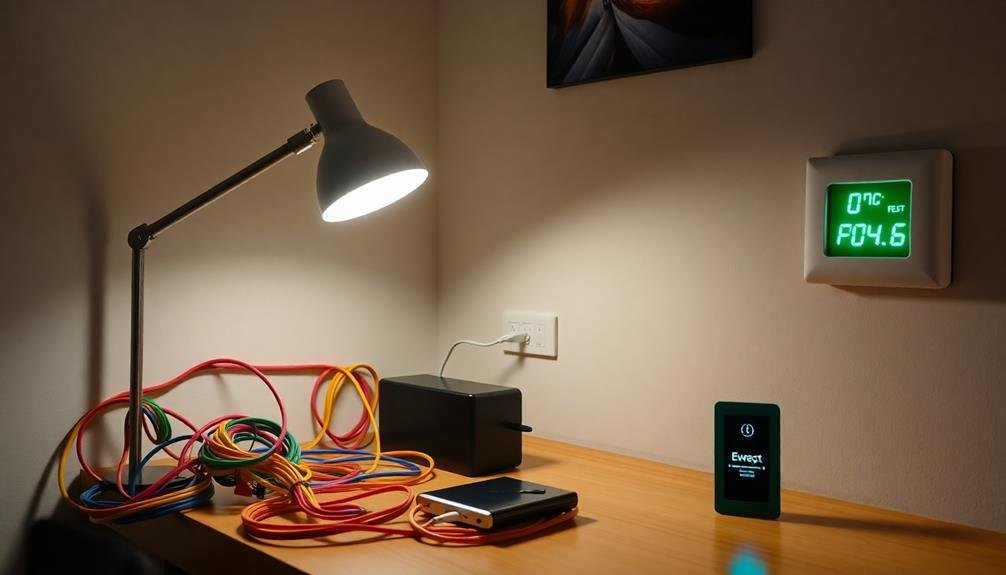When choosing radiant floor heating, you'll want to examine top brands like Warmup, SunTouch, and Nuheat for electric systems, or Uponor, Viega, and Warmboard for hydronic options. These manufacturers offer a range of energy-efficient solutions with varying installation complexities and price points. Key factors to evaluate include energy ratings, installation ease, warranty coverage, and customer support. Electric systems are often more suitable for smaller spaces, while hydronic systems excel in larger areas. Cost-effectiveness depends on initial investment, long-term energy savings, and maintenance needs. By comparing these aspects, you'll be better equipped to make an informed decision for your home's comfort and efficiency.
Understanding Radiant Floor Heating Systems

Radiant floor heating systems offer a unique approach to warming your home. Unlike traditional forced-air systems, they heat from the ground up, providing consistent warmth throughout the space. These systems work by circulating heated water through pipes installed beneath your flooring or by using electric heating elements.
There are two main types of radiant floor heating: hydronic and electric. Hydronic systems use hot water pumped through tubing, while electric systems utilize heating cables or mats. Hydronic systems are more efficient for larger areas, but electric systems are easier to install and ideal for smaller spaces.
You'll find radiant floor heating particularly beneficial in bathrooms, kitchens, and basements. It's compatible with various flooring materials, including tile, hardwood, and carpet. The system's efficiency comes from its ability to heat objects and people directly, rather than just the air.
When considering radiant floor heating, you'll need to factor in installation costs, energy efficiency, and maintenance requirements. While the initial investment may be higher than traditional heating methods, you'll often see long-term savings on energy bills and enjoy superior comfort.
Key Features to Consider
When comparing radiant floor heating brands, you'll want to focus on two critical features: energy efficiency ratings and installation complexity.
Energy efficiency ratings will directly impact your long-term operating costs, so look for systems with high ratings to save money over time.
The installation complexity level is equally important, as it affects both the initial cost and the potential for future maintenance.
Energy Efficiency Ratings
Energy efficiency stands at the forefront of considerations when comparing radiant floor heating brands. When evaluating systems, you'll want to look for high-efficiency ratings that translate to lower energy consumption and reduced utility bills.
Many manufacturers use the Coefficient of Performance (COP) to measure their systems' efficiency. The higher the COP, the more efficient the system.
You should also pay attention to the Annual Fuel Utilization Efficiency (AFUE) rating for gas-powered systems. An AFUE of 90% or higher indicates excellent efficiency. For electric systems, check the wattage output and compare it to the square footage it can heat effectively.
Some brands offer smart thermostats and zoning capabilities, which can greatly improve energy efficiency by allowing you to heat only occupied areas. Look for systems with programmable controls that adjust temperatures based on your schedule and occupancy patterns.
Additionally, consider the insulation quality of the floor and subfloor, as proper insulation can significantly enhance the overall efficiency of your radiant heating system.
Installation Complexity Level
As you compare radiant floor heating brands, it is important to take into account the complexity of installation. Some systems are designed for easy DIY installation, while others require professional expertise. Consider your skill level and budget when evaluating installation complexity.
Look for brands that offer clear instructions, support resources, and user-friendly components. Some manufacturers provide pre-assembled mats or rolls that simplify the layout process. Others may require more intricate wiring or tubing installations.
Here's a comparison of installation complexity levels for popular radiant floor heating brands:
| Brand | Installation Complexity |
|---|---|
| Warmup | Moderate |
| SunTouch | Easy to Moderate |
| Nuheat | Easy |
| Schluter | Moderate to Complex |
| WarmlyYours | Easy to Moderate |
Remember that factors like floor type, room size, and system design can influence installation difficulty. Some brands offer professional installation services, which can be a valuable option if you're not comfortable with DIY projects. Always consult the manufacturer's guidelines and local building codes before starting your radiant floor heating installation.
Top Electric Radiant Heating Brands

You'll find several top-tier electric radiant heating brands competing in the market today.
We'll compare leading brands like Warmup, SunTouch, and Nuheat, examining their key features such as energy efficiency, installation ease, and warranty coverage.
Our analysis will also break down the cost-effectiveness of each brand, helping you make an informed decision for your home heating needs.
Leading Electric Brands Comparison
When it comes to electric radiant floor heating, several brands stand out for their quality, efficiency, and innovative features. SunTouch, WarmlyYours, and Nuheat are among the top contenders in this market.
SunTouch offers a wide range of products, including their popular WarmWire and TapeMat systems. They're known for their user-friendly installation process and energy-efficient designs.
WarmlyYours, on the other hand, specializes in custom solutions and provides excellent customer support. Their TempZone line is highly regarded for its versatility and performance.
Nuheat stands out with its advanced thermostat technology, allowing for precise temperature control and energy management. Their mats and cable systems are compatible with various flooring types, making them a versatile choice for homeowners.
When comparing these brands, consider factors like warranty coverage, installation complexity, and energy efficiency ratings. SunTouch typically offers competitive pricing, while WarmlyYours excels in customization options. Nuheat's strength lies in its smart home integration capabilities.
Ultimately, your choice will depend on your specific needs, budget, and the complexity of your installation project. Each brand has its strengths, so weigh your options carefully before making a decision.
Key Features Analysis
Diving into the key features of top electric radiant heating brands, it's essential to understand what sets each apart. Look for systems with advanced thermostats offering precise temperature control and energy-efficient programming.
Many leading brands now include smart home integration, allowing you to adjust settings via smartphone apps or voice commands.
Consider the heating element type: some use thin cables, while others employ mesh mats. Cable systems offer more flexibility for irregular spaces but may require professional installation. Mesh mats are typically easier for DIY projects and provide more even heat distribution.
Warranty length and coverage vary greatly between brands. Some offer limited lifetime warranties on heating elements, while others cap at 10-25 years. Check if the warranty covers both parts and labor.
Installation ease is another key factor. Look for brands that provide clear instructions, helpful support, and installation videos. Some even offer free design services to guarantee ideal layout.
Lastly, compare energy efficiency ratings. The most efficient systems can help lower your energy bills while providing consistent warmth. Look for brands that highlight their energy-saving features and provide estimated operating costs.
Cost-Effectiveness Breakdown
A brand's cost-effectiveness isn't just about the initial price tag. When comparing radiant floor heating brands, you'll need to take into account long-term value and efficiency.
Look at factors like energy consumption, durability, and maintenance costs to get a complete picture of each system's overall expense.
Some brands offer more budget-friendly options upfront but may cost more in the long run due to higher energy bills or frequent repairs.
Others might've a steeper initial investment but provide significant savings over time through superior efficiency and longevity.
To evaluate cost-effectiveness, contemplate these key points:
- Initial purchase and installation costs
- Energy efficiency ratings and estimated monthly operating costs
- Warranty coverage and expected lifespan
- Maintenance requirements and associated expenses
- Potential energy savings compared to traditional heating methods
Leading Hydronic Heating Manufacturers
Several top-tier manufacturers dominate the hydronic heating industry, each offering unique features and benefits. You'll find that Uponor, Viega, and Warmboard are among the most recognized brands in this space. These companies have established themselves as leaders through their innovative products, reliable performance, and extensive industry experience.
Uponor is known for its durable PEX tubing and thorough system solutions. Viega offers a range of products, including their ProRadiant heating systems. Warmboard stands out with its unique structural subfloor panels that integrate radiant heating.
Here's a comparison of these leading manufacturers:
| Brand | Key Product | Unique Feature | Warranty |
|---|---|---|---|
| Uponor | AquaPEX tubing | Expandable PEX-a | 25 years |
| Viega | ProRadiant systems | Snap Panel technology | 30 years |
| Warmboard | Structural panels | All-in-one solution | 20 years |
When choosing a hydronic heating system, consider factors like installation complexity, energy efficiency, and long-term reliability. Each manufacturer offers different strengths, so it's important to evaluate your specific needs and budget before making a decision. Don't hesitate to consult with a professional installer who can provide expert guidance on the best system for your home.
Cost Comparison Across Brands

Cost plays an essential role in choosing the right radiant floor heating system for your home. When comparing brands, you'll find that prices can vary greatly based on factors like system type, quality, and features.
To help you make an informed decision, consider these key points:
- Entry-level brands like Warmup and ThermoSoft offer more affordable options, often ranging from $5 to $10 per square foot.
- Mid-range brands such as NuHeat and SunTouch typically fall between $10 and $15 per square foot.
- Premium brands like Uponor and Viega can cost $15 to $25 per square foot or more.
- Installation costs aren't included in these estimates and can vary widely based on your location and project complexity.
- Some brands offer DIY-friendly options, which can greatly reduce overall costs.
Remember that while upfront costs are important, you should also consider long-term energy efficiency and potential savings on your heating bills.
Higher-quality systems often provide better performance and durability, potentially offsetting their higher initial cost over time.
Don't forget to factor in warranties and customer support when evaluating the overall value of each brand.
Installation Complexity and Requirements
Installation complexity and requirements vary greatly among radiant floor heating brands, impacting both your choice of system and the overall project timeline. Some brands offer DIY-friendly options, while others require professional installation. You'll need to evaluate your skill level and available time when selecting a system.
For electric systems, brands like WarmlyYours and Nuheat offer easy-to-install mats that you can lay directly under flooring. These are ideal for smaller spaces or retrofits. In contrast, hydronic systems from brands like Uponor or Viega are more complex, requiring professional installation due to their integration with your home's plumbing.
You'll also need to factor in floor height restrictions. Some systems, like Schluter's DITRA-HEAT, are ultra-thin and won't noticeably raise your floor level. Others may require more clearance, potentially affecting door heights and changes between rooms.
Don't forget about electrical requirements. Certain high-powered systems might necessitate upgrading your electrical panel, while others can work with existing circuits. Always check the brand's specifications and consult with an electrician if you're unsure about your home's capacity to support the system you're evaluating.
Energy Efficiency Ratings

Energy efficiency ratings play an essential role in distinguishing radiant floor heating brands. When comparing systems, you'll want to look at their energy efficiency ratings to determine which ones will provide the most warmth while minimizing energy consumption and costs.
Most manufacturers use a standardized rating system, making it easier for you to compare different brands side by side.
Here are key factors to evaluate when assessing energy efficiency ratings:
- Annual Fuel Utilization Efficiency (AFUE) for gas-powered systems
- Coefficient of Performance (COP) for electric heat pumps
- Energy Factor (EF) for electric resistance systems
- Seasonal Energy Efficiency Ratio (SEER) for cooling capabilities
- Energy Star certification for overall efficiency
Higher ratings in these categories generally indicate better energy efficiency.
However, it's essential to acknowledge that actual performance can vary based on your home's specific characteristics and climate.
Some brands may offer additional features like smart thermostats or zoning capabilities that can further enhance energy efficiency.
Customer Satisfaction and Reviews
When evaluating radiant floor heating brands, customer satisfaction and reviews provide invaluable insights into real-world performance and reliability. You'll find that top brands like Warmup, SunTouch, and Schluter consistently receive high marks from homeowners and contractors alike. Look for reviews that highlight ease of installation, energy efficiency, and long-term durability.
Pay attention to both positive and negative feedback, as it can reveal potential issues or limitations of certain systems. For example, some users may report difficulties with thermostat programming or uneven heating in larger spaces. Consider the overall sentiment and patterns in reviews rather than focusing on isolated incidents.
Here's a quick comparison of customer satisfaction ratings for popular brands:
| Brand | Overall Rating | Installation Ease | Customer Support |
|---|---|---|---|
| Warmup | 4.7/5 | 4.5/5 | 4.8/5 |
| SunTouch | 4.5/5 | 4.6/5 | 4.3/5 |
| Schluter | 4.6/5 | 4.4/5 | 4.7/5 |
Remember that reviews can be subjective, so it is crucial to read a variety of sources and consider your specific needs when making a decision. Professional reviews from industry experts can also provide valuable insights into brand performance and reliability.
Warranty and Support Options

Considering the long-term investment of radiant floor heating, warranty and support options play a crucial role in your decision-making process. Top brands typically offer extensive warranties, ranging from 10 to 25 years for their heating elements. Some even provide lifetime warranties on specific components.
When comparing warranties, pay attention to coverage details, such as labor costs and product replacement terms.
Support options vary among manufacturers, but most reputable brands offer:
- 24/7 customer service hotlines
- Online troubleshooting guides
- Professional installer networks
- Technical support for DIY installations
- Dedicated account managers for large projects
You'll want to prioritize brands that provide responsive customer service and readily available technical support. Look for companies offering multiple contact methods, including phone, email, and live chat.
Some manufacturers go the extra mile by providing on-site assistance for complex installations or troubleshooting.
Before making your final decision, research each brand's warranty claim process and read customer experiences regarding support quality.
Frequently Asked Questions
Can Radiant Floor Heating Be Installed Under Existing Flooring?
You can install radiant floor heating under existing flooring, but it's challenging. You'll need to remove the current flooring, install the heating system, and then replace the floor. It's often easier during new construction or renovations.
How Long Does It Take for Radiant Floor Heating to Warm Up?
You'll find that radiant floor heating typically takes 30-60 minutes to warm up. It's slower than forced air systems but provides more consistent heat. The exact time depends on your flooring type and thermostat settings.
Is Radiant Floor Heating Safe for Pets and Children?
Yes, radiant floor heating is safe for pets and children. You'll find it's a gentle, consistent heat that won't burn. There's no exposed heating elements, and it doesn't dry out the air like forced-air systems.
Can Radiant Floor Heating Be Used as the Sole Heat Source?
Yes, you can use radiant floor heating as your sole heat source. It's efficient and provides even warmth throughout your home. However, you'll need to guarantee proper installation and insulation to maximize its effectiveness and meet your heating needs.
What Maintenance Is Required for Radiant Floor Heating Systems?
You'll find radiant floor heating requires minimal maintenance. You should annually check for leaks, bleed air from the system, and inspect the boiler or heat source. It's wise to have a professional service every few years.
In Summary
You've now explored the top radiant floor heating brands and their key features. Remember to evaluate factors like cost, energy efficiency, and installation requirements when making your choice. Don't forget to contemplate customer reviews and warranty options. With this knowledge, you're well-equipped to select the perfect radiant heating system for your home. Enjoy the comfort and efficiency of your new warm floors!





Leave a Reply